During the early hours of 20th June 1966, Shivering Sands fort, the home of Radio City, was boarded by a raiding party. The disc-jockeys were locked out of the studio and the station was
silenced. Within a few days Reg Calvert, City's owner, was dead, shot by the boss of a rival station. The Pirate Radio Hall of Fame looks back at that fateful week with the help
of some of the people who were there.
|
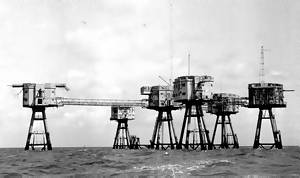
|
|
Shivering Sands, the home of Radio City. Photo published by the Free Radio Association, kindly donated by George Morris.
|
The story that culminated in the raid on Shivering Sands began the previous year. In August 1965 merger talks had started between Radio City and Radio Caroline South. The ship-borne station had a problem.
After a successful launch in 1964, in the last few months it had lost a sizeable proportion of its listenership to the more powerful, more professional Radio London. And, with the ratings down, the advertising revenue
had plummeted. To make matters worse, there were rumours of yet another big American station on the horizon. As the fort was considerably cheaper to run, Project Atlanta, the owners of Caroline South, proposed that they should
take over Shivering Sands to use as the base for their station. Their ship, the mv Mi Amigo, would then move to a new anchorage somewhere where there was less offshore competition - possibly off the west country or the north-east.
Talks between Project Atlanta and Radio City's owner, Reg Calvert, proceeded and a jointly-owned company was set up to look after the selling of advertising for both stations. This was announced to the
press on 22nd September.
For the listeners, the only noticeable signs of this collaboration were that Radio City began to re-broadcast Caroline's news, recorded off air and transmitted an hour later, and occasionally plugged
some of the bigger station's programmes.
 Tom Edwards closes down Radio City for the night with a news bulletin relayed from Caroline South, 3rd December 1965 (duration 2 minutes 13 seconds)
Tom Edwards closes down Radio City for the night with a news bulletin relayed from Caroline South, 3rd December 1965 (duration 2 minutes 13 seconds)
A more powerful transmitter was bought, second hand, from a Texan radio station, KCUL Fort Worth. It arrived in October and was taken out to the fort by Caroline South engineers Carl
Thomson and Ted Walters. The transmitter was in three large crates but unfortunately one of them fell into the sea. It was retrieved with the help of some divers from a local branch of The British
Sub Aqua Club but the City engineers Ian West and Phil Perkins never managed to make it work. It required more power than the station's generators could provide. When
this was reported back to Project Atlanta's Allan Crawford, he investigated the hire of a new generator. Customs problems delayed its delivery and, when Atlanta investor Jarvis Astaire decided he wasn't prepared to put any more
money into the station, the rental had to be cancelled.
Project Atlanta had run out of steam. At the end of December 1965 the owners of Caroline North took over the South ship as well. Ronan O'Rahilly and his team were now in charge. And with the departure of the Atlanta management,
the deal with Radio City ended. Reg Calvert carried on operating Radio City on his own but now he also began talks with Caroline's great rival, Radio London. After long discussions between the two organisations, a
deal was done. A draft document was drawn up in May 1966 which proposed setting up a company, Sweet Music, to be owned jointly by Calvert and Radio London. This company would operate a new station, to be known as UKGM (United Kingdom
Good Music).
|
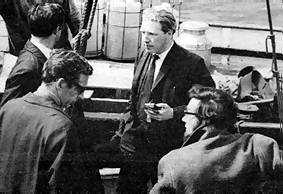
|
|
Dennis Maitland, Duncan Johnson, Martin Newton and Reg Calvert on the trip out to Shivering Sands. Photo by Martin Stevens.
|
Big L disc-jockeys Duncan Johnson and Keith Skues were appointed to look after the programming of this new venture. In June 1966 these two, along
with Radio London director Dennis Maitland and engineer Martin Newton, visited the fort to inspect the installation. They were not impressed. In fact they were fairly horrified by the living conditions
and, even more, by the technical standards that they found. However their opinions were to prove irrelevant.
Major Oliver Smedley was the chairman of Project Atlanta. The loss of control of Caroline South at the end of 1965 had been a bitter blow - one that he blamed on Managing Director Allan Crawford. He still wanted to be involved in
offshore radio - maybe using Project Atlanta's one physical asset, the transmitter which had been delivered to the City fort. With growing unease he saw the City/London/UKGM talks progressing. He had visions of losing this precious
item. Despite the fact that it had been declared unserviceable by the City engineers, he wasn't prepared to lose it. Or at least, not unless he got a share of the UKGM action. He decided to take matters into his own hands.
In early June Reg Calvert received a telephone call from Ted Allbeury, the boss of the rival Radio 390. He had heard rumours that some one was plotting to take over City's fort by force. He was right.
On the night of 19th/20th June 1966 a group of burly ships' riggers, out of work because of a seamen's strike, along with Smedley and Project Atlanta investor Kitty Black, boarded Shivering Sands under cover of darkness. They surprised
the sleeping occupants and locked the disc-jockeys out of their studio. Ian MacRae was on board at the time:
|
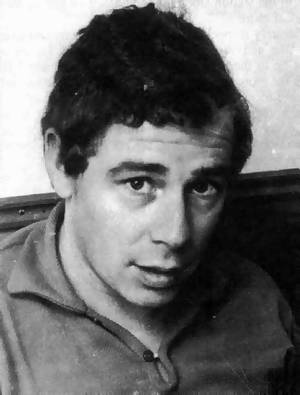
|
|
Ian MacRae. Photo from ‘Pop Went The Pirates’, published by Lambs' Meadow Publications.
|
“The first awareness I had of something unusual going on was when I was woken up by the sound of ship engines outside the open windows of the accommodation tower
and shouting voices. The bunkroom door was also open and I could see lights were on that normally wouldn't be at that time in the morning and there was the sound of activity and more voices from the floor below. I
looked at my watch and it was close to 3.30am Monday morning. Quickly throwing on some clothes and still half asleep, I stumbled down the metal stairs to find a number of strangers, very large men, in what we
laughingly called the kitchen, talking to some of the Radio City crew. It took a while to realize that they were a boarding party, that there were more of them in other parts of the station and we had been taken
over.
I seem to remember a meeting of all the radio people was called in the lounge area where it was explained that they were there for our own protection ... from exactly what wasn't explained ... and that we were not
to leave the accommodation tower because the studio tower was strictly off limits. (We only used two towers in the cluster.) Apart from the studios, that second tower contained the generators and the winch used
for bringing people on board the station. So that meant we were effectively off the air. It turned out that they had also taken the crystal out of the transmitter and hidden it as back-up insurance that if anyone
did get access they still couldn't get a signal out. This was pretty unlikely to happen as they posted a full time guard at the entrance to the studio tower.
It turned out that a few of the boarders had left with the tug they came out on by the time I'd got myself downstairs so I missed out seeing the lady in the party who was named Kitty Black. I've often wondered
what she looked like. I imagined a sort of gung-ho Emma Peel type as in the TV series The Avengers.
We had no idea what was going on and what the reason for this extreme action was. Of course we later found that out. To simplify the situation it all came down to a high powered transmitter that had been brought
out to the station much earlier that Smedley's people claimed they owned. When they got word that Reg might be about to sell the station they wanted a share of the action. What wasn't taken into account was that,
when the transmitter was being winched on board, something had gone wrong and it finished up in the sea for some time and try as hard as they could the technicians were never able to get it to stay on air for any
length of time. So basically it was worthless anyway.
I recently spoke to Radio City engineer Tony Pine who told me that the transmitter never worked properly, not just because of the effect of sea water, but because the generators weren't
able to provide enough power to drive it. I recall we had to turn off all other electrical devices such as lights etc. when the big transmitter was running but the generator just wasn't up to the task. The engineers
had warned Reg Calvert about this, when he told them the transmitter was coming out, but he just ignored the advice saying ‘Find a way to make it work!’”
Alan Clark was also on board at the time of the raid. Speaking about it in an interview in 1997, he remembered:
|
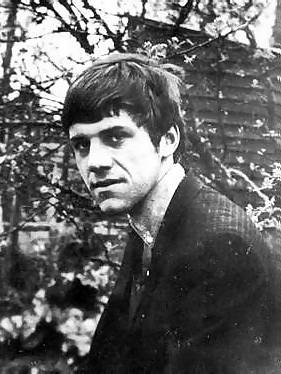
|
|
Alan Clark. Photo kindly provided by Raoul Verolleman.
|
“There was a dispute between Reg Calvert and Oliver Smedley and this dispute took place at the time of a seamen's strike. Without going into the details of the dispute,
to cut a long story short, it climaxed in Major Smedley recruiting some striking seamen to sail out to the fort in a tug and take the place over. I was there at the time, along with a number of other people, and we
were quite surprised to peer out of a porthole to see this tug nearby and lots of men rowing towards us in their boat. Then of course they came on board, took over the place, ripped the studio apart, placed it out of
bounds. There was no violence. They didn't hurt us or anything like that but they certainly kept us off the air for a few days.”
Having ensured the station would remain silent, Oliver Smedley and Kitty Black returned to land. They called on Radio London's Managing Director, Philip Birch, and invited him to attend a meeting later in the
day. It proved to be a very stormy gathering, held at the Project Atlanta offices in Soho's Dean Street. Smedley was insistent that it was his transmitter and claimed that, as he now had possession of the fort, he wanted a share of
the deal with Radio London. Birch stated that he was not interested in doing any deal under duress and, after just fifteen minutes, walked out. Shortly after his departure, an irate Reg Calvert arrived. Smedley told him he could have
his station back for £5,000 and a share of the advertising revenue. Calvert refused and demanded that the boarding party leave immediately. He said he would take Shivering Sands back, if necessary by force.
That evening Reg Calvert paid a visit to Smedley's home in Wendens Ambo, Essex, determined to sort out this dispute and get his fort back. Reg's daughter Susan Moore (née Calvert) remembers that dreadful night
and the events leading up to it:
|

|
|
Reg and Dorothy Calvert, with Shivering Sands in the background. Photo copyright Susan Moore.
|
“Smedley had wanted to become a partner and was all talk and did not meet his end of the arrangement. He was supposed to supply a new transmitter etc. When it came, it
was older than the one already being used and it also fell into the sea when they tried to get it on board. Nothing was heard from him again and no further discussions or agreements.
In May/June Radio London wanted to buy the station off my father. My parents were really pleased and were in discussion and looking forward to having a holiday in Spain to celebrate. They had just been for their
injections when the station was boarded. They both had bad reactions to the injections. My mother was ill in bed and my father had a really bad arm and could not drive.
He had contacted the police to see if they could remove the boarders but they said they couldn't as it was outside their jurisdiction. They suggested he go to see Smedley and discuss it with him.
(Alan) Arnold who had supplied the (Radio City) aerial was very concerned and he offered to drive my father to Smedley's house. Smedley knew my father was coming as Arnold had called him. Smedley was there, waiting
with his gun. My father was not a violent man. He did not threaten people. He went to negotiate with Smedley and also took enough money with him to bribe the boarders off the station if Smedley did not agree. He
was very concerned for his men.”
|
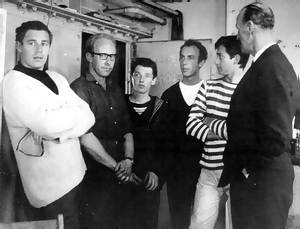
|
|
Radio City DJs being interviewed by Det. Supt. George Brown. Photo copyright Syndication International, reprinted from ‘Offshore Radio’, published by Iceni Enterprises.
|
Calvert and Arnold arrived at Smedley's house. Pamela Thorburn, Smedley's secretary and housekeeper, tried to stop them getting in. Calvert was insistent and a scuffle developed between him and
Thorburn. The Major grabbed a shotgun, took aim, and shot Calvert dead. The police were called and Smedley charged with murder. This was reduced to a charge of manslaughter and later, when the case came to court,
he was acquitted.
 The BBC's News & Radio Newsreel reports Smedley's arrest and interviews Radio City's Paul Elvey as well as Alf Bullen, leader of the raiding party. David Symonds is the
newsreader, Tom Mangold the reporter (duration 3 minutes 41 seconds)
The BBC's News & Radio Newsreel reports Smedley's arrest and interviews Radio City's Paul Elvey as well as Alf Bullen, leader of the raiding party. David Symonds is the
newsreader, Tom Mangold the reporter (duration 3 minutes 41 seconds)
Philip Birch announced that Radio London was pulling out of the UKGM deal. His company had always behaved in an ethical and legal manner, even if it was operating a radio station outside the
law, and he wanted nothing to do with these strong-arm tactics.
Meanwhile the fort was still boarded, although the raiding party did allow a change of crew. A party of policemen also visited the fort to interview the raiders and City staff but they informed Reg's widow Dorothy
Calvert that there was nothing they could do to help her as the fort was outside the territorial limit and, therefore, outside their jurisdiction.
Going out to the fort, as part of the crew change, was senior DJ Tom Edwards:
|
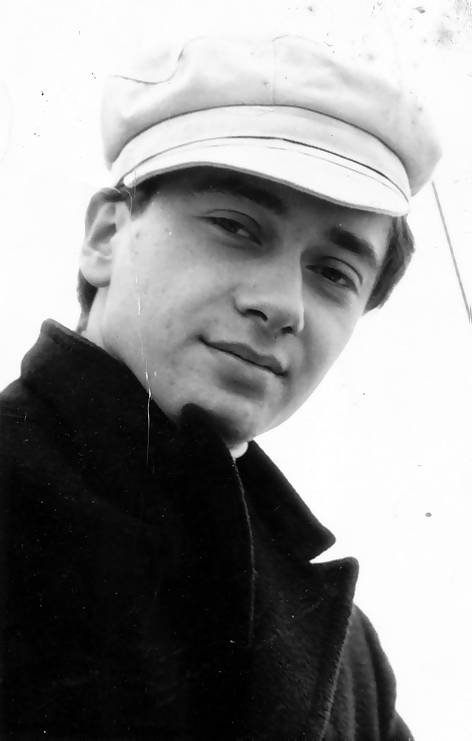
|
|
Tom Edwards. Publicity photo kindly provided by Angus Boucher.
|
“I went out to Radio City knowing the raiders were still there. They were polite although ‘rough’ characters. I was a young man and could strut my
stuff but yes of course I was frightened. Then the news came that Reg had been shot. For goodness sake, I had only been with him the day before in London and yes he was ‘wound up’ ......... its news that
didn't sink in at first. And there were police officers and newspaper reporters everywhere both on and off the forts.
The raiders were not happy and Big Alf, who seemed to be in charge, said to me that he didn't know anyone was going to get killed ...”
 Following the crew change, the BBC's Tom Mangold interviewed Paul Elvey again (duration 1 minute 52 seconds)
Following the crew change, the BBC's Tom Mangold interviewed Paul Elvey again (duration 1 minute 52 seconds)
The Government had been making threatening noises about the offshore stations for two years but the pirates were too popular. Harold Wilson's Labour administration only had a small Parliamentary
majority and, until now, had delayed taking action because of the risk of losing popular support. But Calvert's death gave them the perfect excuse to act. They announced that legislation would be introduced soon.
 ITN reports that the government is to act against the offshore stations and interviews Dorothy Calvert (duration 2 minutes 16 seconds)
ITN reports that the government is to act against the offshore stations and interviews Dorothy Calvert (duration 2 minutes 16 seconds)
|
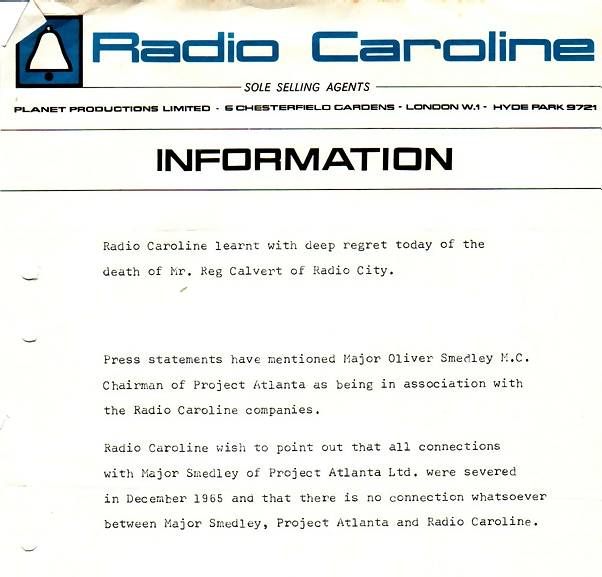
|
|
Radio Caroline press release. Click to magnify. Courtesy of Hans Knot.
|
Ian MacRae:
“After the death of Reg, the boarders were called off the forts. They'd been there one week. It was later claimed they were not armed. This is not true. At least one, if not more, had guns.
A question still haunts me about the incident. Who was it that left the trapdoor, that was normally always bolted, unlocked to allow the boarders access? I have my suspicions but no proof. Another point worth mentioning.
The day the boarding party came on was my birthday. I didn’t get a cake that year!
After the raiders left we were a bit concerned about going onto the broadcast tower because we thought they may have booby trapped it with a bomb or something. However we eventually plucked up courage and mounted a
search for the hidden (transmitter) crystal. I think it was one of the technicians who found and restored it and got us back on air. As the boarding party were leaving one of them shouted back up at us: ‘Play us
a song when you can’. As I was first back on the air I thought I would do just that and played them Strangers In The Night (by Frank Sinatra).”
Alan Clark:
“There was a feeling that it might well have been an ‘inside job’ in the sense that these marine structures are quite hard to gain access to. They are way, way above the surface
of the sea and it was felt that someone must have helped them on board but who that person was I have no idea.”
Tom Edwards: “These huge fellas left as quickly and silently as they had arrived and my first reaction was to get the station back on air as soon as possible. Which we did and I think it was
Ian MacRae who did the opening show. Dorothy Calvert came out to see us and I recall seeing her tired face as she pulled alongside Shivering Sands in (the tender) Harvester II. She told us all she would carry on running
the station and that's just what happened ... but the writing was on the wall.”
 Just after 10 o'clock on the night of 26th June 1966, the raiders have gone and Ian MacRae is reopening Radio City. He invites engineers Ian West and Tony Pine to send messages to their loved-ones on land. Many thanks to
Peter J Parish for this recording (duration 2 minutes 11 seconds)
Just after 10 o'clock on the night of 26th June 1966, the raiders have gone and Ian MacRae is reopening Radio City. He invites engineers Ian West and Tony Pine to send messages to their loved-ones on land. Many thanks to
Peter J Parish for this recording (duration 2 minutes 11 seconds)
 It is the next morning, 27th June 1966, and things are back to normal on Radio City. Ian MacRae and Tom Edwards are behind the mic. This clip is taken from a recording shared on The Offshore Radio Club Forum by Hans Hendriks. Our thanks to him (duration 4 minutes 31 seconds)
It is the next morning, 27th June 1966, and things are back to normal on Radio City. Ian MacRae and Tom Edwards are behind the mic. This clip is taken from a recording shared on The Offshore Radio Club Forum by Hans Hendriks. Our thanks to him (duration 4 minutes 31 seconds)
Many thanks to Ian, Alan, Tom and Susan for sharing their memories
and to Nick Widdows for all the audio clips except the last two.
We have press cuttings dating from the time of the raid, courtesy of Nigel Fell & Jonathan Shirley and Martin Ransom.
For a description of the raid from a different perspective, see the article by Kitty Black on the Offshore Echos website.
Back to the previous page.
The final part of the Radio City story is over the page.
|

